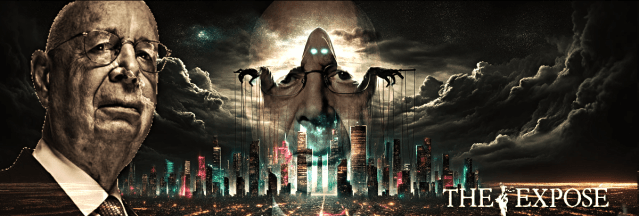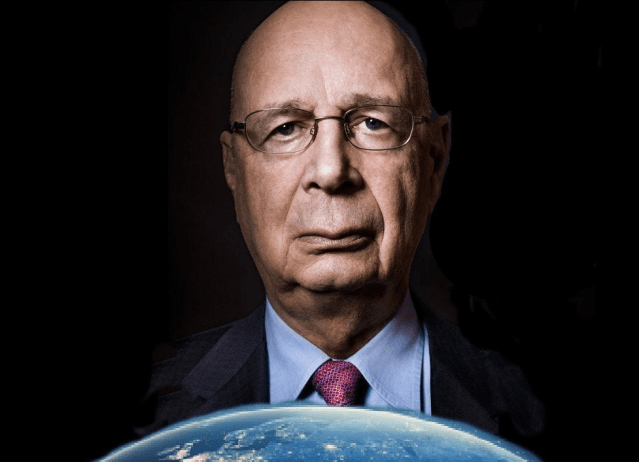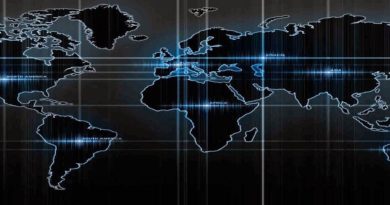From Democracy to Dystopia: The World Economic Forum’s Stealth Takeover
In a world increasingly shaped by shadowy figures and clandestine gatherings, the World Economic Forum (WEF), spearheaded by Klaus Schwab, emerges as a formidable architect of a future where national borders blur and the voices of the unelected echo loudest in the halls of power.
This narrative delves into the dark underbelly of global governance, where the WEF’s influence stretches far beyond its publicized mission, casting long shadows over the essence of democracy and sovereignty.

Let’s not lose touch…Your Government and Big Tech are actively trying to censor the information reported by The Exposé to serve their own needs. Subscribe now to make sure you receive the latest uncensored news in your inbox…
Introduction to a New Order
In the shadows of the Swiss Alps, the World Economic Forum has evolved from its 1971 inception into a nexus of power, where global elites converge to draft the blueprint of a new world order. Founded by Klaus Schwab, a figure both praised and vilified, the WEF has transcended its original economic focus, morphing into a behemoth that orchestrates the convergence of political, business, and academic leaders to engineer the future. Amid this transformation, alarms ring over the erosion of national sovereignty, propelling us to scrutinize the WEF’s clandestine role in sculpting a global governance model that benefits the few at the expense of the many.
Klaus Schwab: The Puppeteer in Geneva

Klaus Schwab, the mastermind behind the WEF, holds the world’s reins from his Geneva stronghold, wielding influence that crosses continents and penetrates governments. Under his stewardship, the annual Davos gatherings have become synonymous with secrecy and elite consensus-making, where agendas are set not in the open halls of democracy but in closed rooms and whispered conversations. Schwab’s vision of a cohesive global society is marred by the spectre of a unified elite, dictating terms and policies that serve their interests while masquerading as global improvement initiatives.
The WEF’s Instruments of Influence
Beyond the glitzy facade of its annual meetings, the WEF operates through insidious means, embedding its tentacles within national governments through programs like the Young Global Leaders. This initiative, cloaked in leadership development, is a factory for producing loyalists to the WEF creed, ensuring that the future leaders of sovereign nations are in lockstep with the Forum’s globalist agenda. The infiltration is silent but swift, as these anointed individuals ascend to positions of power, carrying with them the seeds of Schwab’s vision, ready to sprout within the heart of governments worldwide.
In the labyrinthine corridors of global power, the World Economic Forum (WEF) wields its influence through a meticulously crafted arsenal of instruments designed to embed its agenda deep within the fabric of global governance. This expansion delves into the multifaceted strategies employed by the WEF to extend its reach beyond the annual meetings in Davos, subtly orchestrating the reshaping of political, economic, and social landscapes across the globe.
Strategic Initiatives and Partnerships
At the heart of the WEF’s influence lies its ability to forge powerful alliances across sectors. Through strategic initiatives that target critical areas such as climate change, cybersecurity, and healthcare, the WEF creates platforms for collaboration that entice governmental, corporate, and civil society leaders. These initiatives often set the agenda for global action, subtly aligning it with the WEF’s vision. By orchestrating these cross-sector partnerships, the WEF positions itself as an indispensable node in the network of global governance, guiding the direction of policy and investment without wielding formal authority.
The Shadow Cabinet: WEF Alumni in Power
The notion of a “Shadow Cabinet” composed of World Economic Forum (WEF) alumni in positions of power is not merely speculative; it is a manifestation of the Forum’s far-reaching influence across the globe. This elite cadre of leaders, moulded within the corridors of Davos and the classrooms of the Young Global Leaders (YGL) program, has ascended to pivotal roles in governments, corporations, and civil society organizations, wielding considerable sway over the direction of global policy and governance. This expansion explores the depth and implications of the WEF’s alumni network as they navigate the corridors of power, embedding the Forum’s agenda within the structural fabric of global leadership.
The WEF’s Alumni: Global Leaders with a Common Creed
The WEF has been remarkably successful in positioning its alumni in strategic roles around the world. These individuals, having been exposed to the WEF’s ethos of global cooperation and governance, carry with them a set of ideals and priorities that often align closely with the Forum’s objectives.
Whether it’s in the implementation of policies that favour global over national interests, the promotion of economic globalization, or the championing of environmental and social initiatives that reflect the WEF’s agenda, the influence of these alumni is palpable in the policy shifts and initiatives they support.
The reach of the WEF’s alumni network is both profound and disturbing, with key figures in international politics bearing the mark of their Davos indoctrination. From Emmanuel Macron in France to Justin Trudeau in Canada, these leaders, once hailed as harbingers of change, now stand accused of being marionettes dancing to the tune of Schwab’s orchestration. In the United States, the Biden administration’s corridors are whispered to be lined with WEF disciples, further blurring the lines between elected governance and global governance by proxy.
In the shadowy corridors of global influence, the World Economic Forum’s Young Global Leaders (YGL) program emerges as a meticulously designed crucible for the elite, a breeding ground for a new class of rulers in a world increasingly veiled in dystopian undertones. This initiative, targeting the brightest young minds across various domains—business, government, academia, and beyond—serves not merely to address the pressing challenges of our time but rather to sculpt a future where power is concentrated in the hands of those indoctrinated with a singular, globalist vision.
Architects of the Past: The Foundation of Control
The YGL program, in its formative years, quietly laid the groundwork for an intricate web of influence, selecting individuals who would go on to occupy pivotal positions within the global elite. These early cohorts, lauded for their contributions to technology, finance, and politics, were the vanguards of a silent revolution, subtly steering the course of human progress toward the objectives set forth by their benefactors. Figures such as Jack Ma and Sheryl Sandberg, under the guise of innovation and leadership, were instrumental in weaving the digital fabric that now envelops the globe, binding us in a network of surveillance and dependency that was once the realm of science fiction.
Guardians of the Present: The New Order
Today, the YGL program has evolved, or perhaps more accurately, revealed its true intent—a relentless pursuit of a world governed not by the many, but by an enlightened few. The present generation of Young Global Leaders stands at the forefront of this new order, champions of sustainability and social justice, yet their noble causes mask a deeper agenda. Under the banner of climate action and equity, they advocate for policies that further erode national sovereignty, advocating for a unified global governance that transcends the outdated notions of democracy and freedom.
Individuals like Greta Thunberg and Sanna Marin are the faces of this movement, embodying the virtues of youth and progress while guiding the masses toward a future where individual choice is sacrificed at the altar of collective salvation. Their rise to prominence is no accident but rather a testament to the YGL program’s success in moulding leaders who can sway public opinion and policy with the grace of a conductor leading an orchestra.
The transition from the architects of the past to the guardians of the present within the YGL program is a narrative steeped in dystopian reality. It is a tale of how the quest for a utopian future has paved the way for an era of unparalleled control, where the ideals of democracy and national identity are submerged beneath the rising tide of global governance.
This cadre of young leaders, handpicked and shaped in the image of their forebearers, stand ready to inherit a world where the lines between leadership and dominion blur, heralding a new age of enlightenment shadowed by the spectre of tyranny. In this future, the YGLs are not merely influencers but architects of a new world order, where the many are led by the few, under the watchful eye of those who once dreamed of a world remade.
Conclusion: The Dimming Light of Sovereignty
As the World Economic Forum continues to expand its shadow over global affairs, the very concept of national sovereignty and democratic governance is under siege.
The WEF’s dystopian vision of a world governed by the elite, for the elite, challenges the foundational principles of self-determination and public accountability.
In these dark times, the call to action is not for engagement or reform but for a reclamation of voice and power by the global citizenry, lest they find themselves inhabitants of a world where the few rule the many, and the light of democracy is extinguished by the shadow of Klaus Schwab and his World Economic Forum.
This article has been archived for your research. The original version from The Exposé can be found here.



